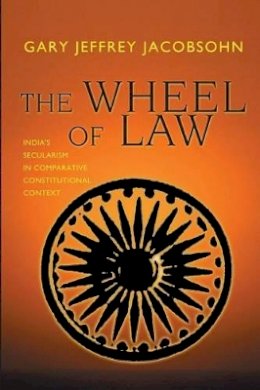
Stock image for illustration purposes only - book cover, edition or condition may vary.
The Wheel of Law: India´s Secularism in Comparative Constitutional Context
Gary J. Jacobsohn
€ 74.08
FREE Delivery in Ireland
Description for The Wheel of Law: India´s Secularism in Comparative Constitutional Context
Paperback. How can religious liberty be guaranteed in societies where religion pervades everyday life? This work addresses this dilemma by examining the constitutional development of secularism in India within an unprecedented cross-national framework that includes Israel and the United States. Num Pages: 344 pages, 1 line illus. 1 table. BIC Classification: 1FKA; JPVH4. Category: (P) Professional & Vocational; (U) Tertiary Education (US: College). Dimension: 229 x 152 x 21. Weight in Grams: 485.
How can religious liberty be guaranteed in societies where religion pervades everyday life? In The Wheel of Law, Gary Jacobsohn addresses this dilemma by examining the constitutional development of secularism in India within an unprecedented cross-national framework that includes Israel and the United States. He argues that a country's particular constitutional theory and practice must be understood within its social and political context. The experience of India, where religious life is in profound tension with secular democratic commitment, offers a valuable perspective not only on questions of jurisprudence and political theory arising in countries where religion permeates the fabric of society, but also on the broader task of ensuring religious liberty in constitutional polities. India's social structure is so entwined with religion, Jacobsohn emphasizes, that meaningful social reform presupposes state intervention in the spiritual domain. Hence India's "ameliorative" model of secular constitutionalism, designed to ameliorate the disabling effects of the caste system and other religiously based practices. Jacobsohn contrasts this with the "visionary" secularism of Israel, where the state identifies itself with a particular religion, and with America's "assimilative" secularism. Constitutional globalization is as much a reality as economic globalization, Jacobsohn concludes, and within this phenomenon the place of religion in liberal democracy is among the most vexing challenges confronting us today. A richly textured account of the Indian experience with secularism, developed in a broad comparative framework, this book is for all those seeking ways to respond to this challenge.
Product Details
Format
Paperback
Publication date
2005
Publisher
Princeton University Press United States
Number of pages
344
Condition
New
Number of Pages
344
Place of Publication
New Jersey, United States
ISBN
9780691122533
SKU
V9780691122533
Shipping Time
Usually ships in 7 to 11 working days
Ref
99-1
About Gary J. Jacobsohn
Gary Jeffrey Jacobsohn is Fred Greene Third Century Professor of Jurisprudence and Politics at Williams College. He is the author of "Apple of Gold" (Princeton), "The Supreme Court and the Decline of Constitutional Aspiration", and "Pragmatism, Statesmanship, and the Supreme Court".
Reviews for The Wheel of Law: India´s Secularism in Comparative Constitutional Context
"An important effort to understand Indian secular constitutionalism in a comparative perspective. Scholars of comparative constitutional law, religion and law, multiculturalism, and Indian law and statecraft will benefit from critically engaging with its contributions."
Narendra Subramanian, Law and Politics Book Review "The Wheel of Law is a most impressive achievement, thorough in research, astute in insights, and almost dazzling in execution and authorial resourcefulness. Deftly weaving together constitutional history, judicial logic, political development, and philosophical deliberation, this book is not merely a contribution to the discourse; it illuminates, and, in many ways, changes it."
Ahrar Ahmad, Perspectives on Politics
Narendra Subramanian, Law and Politics Book Review "The Wheel of Law is a most impressive achievement, thorough in research, astute in insights, and almost dazzling in execution and authorial resourcefulness. Deftly weaving together constitutional history, judicial logic, political development, and philosophical deliberation, this book is not merely a contribution to the discourse; it illuminates, and, in many ways, changes it."
Ahrar Ahmad, Perspectives on Politics
